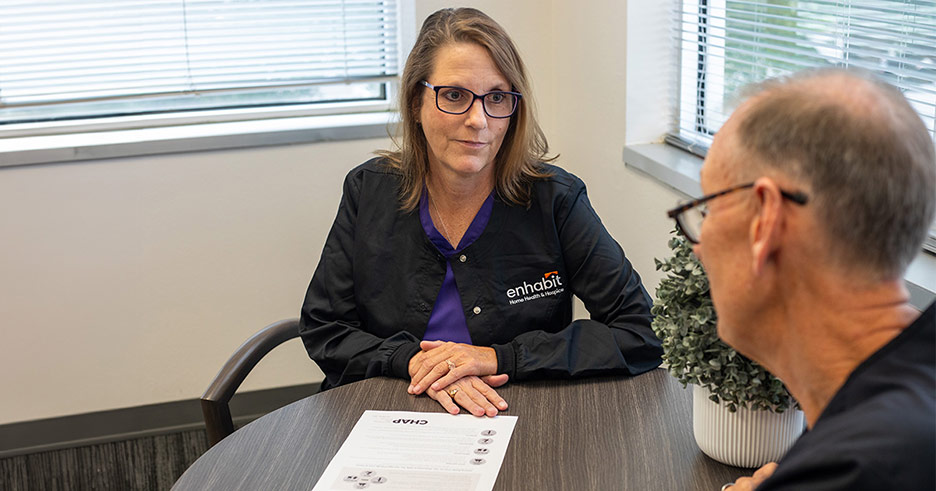As a hospice social worker at Enhabit Home Health & Hospice, Sonya lives with the motto to bear the burden of others – a lesson she learned early on in her grandmother’s hospice experience.
“My grandmother had a social worker in hospice care,” she said. “Once that social worker came in and talked to me to make sure my grandmother had everything she needed to go home, I knew this is what I want to do and what I am made to do.”
Hospice social workers, like Sonya, strive to meet the basic human needs of all people and possess a strong desire to help improve patients’ lives.
What does a hospice social worker do?
The overall job of a hospice social worker is to assess the emotional, social and financial needs of patients and their loved ones to connect them to short-term counseling and community resources.

Specifically, hospice social workers can help assist with obtaining:
- Attendant or personal care
- Medication expense assistance
- Emergency buttons
- Transportation
- Assistance with rent or utilities
- Food stamps or grocery assistance
“I go from home to home making certain a patient’s environment is safe, they have food and they have everything they need to be comfortable,” Sonya said. “I also prepare them and the caregivers for the end of life. I’ll go in and talk with the caregiver to make certain that the patient is getting everything they need – medications, supplies, contacts to community resources, etc. – especially before the weekend.”
As with other home-based care professionals, hospice social workers drive from patient to patient each day.
“I normally try to see five patients a day,” Sonya said. “I like to strategically plan them out too so that I can start my day with patients who bring the highs to me – like one patient that enjoys feeding birds in the morning – and I’ll end my day with patients who have infinite needs.”
What’s it like to be a hospice social worker?
A day in the life of a social worker looks different for each person, but they all share a deep passion for the profession.
When it comes to hospice care, social workers spend a lot of time getting to know patients and their families, as they connect them to resources throughout their end-of-life journey.
Sonya W.
LMSW
“My favorite part is going in the homes and just establishing a relationship with the family. You get to know them and you converse with them about life, experiences and what they’ve been through. It’s just amazing to hear their stories and get to know what their life was like prior to the terminal illness.”
But hospice social workers aren’t on a team of one. They are a part of a larger interdisciplinary team of attending physicians, registered nurses, chaplains and more skilled professionals to provide patients with the care they need, no matter whether it is physical, emotional or spiritual.
“It is so eye opening to see how the interdisciplinary team works together,” Sonya said. “Everyone brings something special to the team and that’s what I love about hospice. Even though I am the only social worker on the team, you take a team approach to helping the families.”
How do hospice social workers make a difference in the lives of patients?
Whenever patients and families are on the end-of-life journey, they can experience a lot of hardship.
Hospice social workers like Sonya help families navigate hardships. That way, they can have a high quality of life during a patient’s last months. Whether they need help with a complicated or simple task, Sonya assists by offering access to various community resources.
One patient of Sonya’s was living in poverty. To help feed the family, Sonya assisted with obtaining food from the food pantry. And after learning that the patient’s granddaughter really enjoyed canned peas and carrots, Sonya made sure to include a few cans of the mixed vegetables.
“After the family received the food, the granddaughter started jumping up and down and dancing because I got her favorite mixed vegetables,” she said. “When I got back to my car after my visit with them, I had an “aha!” moment that something so simple – liked canned mixed vegetables – can make people jump up and down.”
Read more stories about how hospice social workers have helped patients and their loved ones.
How can I get started with my career in hospice?
If you enjoy helping others, a career in hospice may be a good fit. Although Sonya says it is a very rewarding job, she has advice for those entering the hospice social work field.
“I always tell myself and others to be prepared,” she said. “Being a social worker, you have to be prepared with your resource guide and have someone in your toolkit that can help with a particular need. And remain connected to your community – that’s the main thing. It’s important for you to go to workshops and always continue to learn.”
Just like becoming a social worker in any other field, to become a hospice social worker, you must have either a bachelor’s (BSW) or a master’s degree (MSW) from a school of social work accredited by the Council on Social Work Education. In most states, you will also need a license to practice social work, such as a LSW or LMSW.
To work at Enhabit, you must have a BSW or MSW and one year of social work experience in a health care setting.
 Back to Resource library
Back to Resource library
Browse top categories
Social Share
At Enhabit our patients are our number one priority. From providing the latest medical practices to building deep personal connections, we’re focused on upholding every patient’s dignity, humanity and sense of control on their health care journey.
Home health
Our home health services give patients access to the care they deserve in the comfort of their own homes. From disease and injury management to recovery from surgery, our clinicians help patients confidently achieve their healthcare goals.
Hospice care
Our hospice care services place importance on the comfort of every patient living with a terminal illness. Our caring professionals are dedicated to providing not just physical care, but spiritual and emotional support to every patient and their loved ones.






